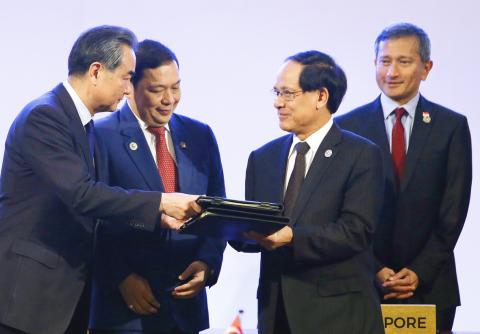Southeast Asian foreign ministers yesterday ended an impasse over how to address disputes with China in the South China Sea, issuing a communique that called for militarization to be avoided and noting concern about island-building.
The South China Sea has long been the most divisive issue for ASEAN, with China’s influence looming large over its activities. Some countries are wary about the possible repercussions of defying Beijing by taking a stronger stand.
ASEAN on Saturday failed to issue the customary statement, over what diplomats said was disagreement about whether to make oblique references to China’s rapid expansion of its defense capabilities on artificial islands in disputed waters.

Photo: AP
China is sensitive to even a veiled reference by ASEAN to its seven reclaimed reefs, three of which have runways, missile batteries, radars and, according to some experts, the capability to accommodate fighter jets.
The communique issued late yesterday takes a stronger position than an earlier, unpublished draft, which was a watered-down version of one issued last year in Laos.
The agreed text “emphasized the importance of non-militarization and self-restrain.”
It said that after extensive discussions, concerns were voiced by some members about land reclamation “and activities in the area which have eroded trust and confidence, increased tension and may undermine peace, security and stability.”
ASEAN’s deadlock over the statement highlights China’s growing influence on the grouping at a time of uncertainty over the new US administration’s security priorities and whether it will try to keep China’s maritime activities in check.
Several ASEAN diplomats said that among the members who pushed for a communique that retained the more contentious elements was Vietnam, which has competing claims with China over the Paracel Islands (Xisha Islands, 西沙群島) and Spratly Islands (Nansha Islands, 南沙群島) and has had several spats with Beijing over energy concessions.
However, another diplomat said there was no real disagreement on the contents of the communique and stressed that the initial draft was seen by some members as weak.
The ASEAN ministers also mentioned in their 46-page statement a vague reference to an international arbitration ruling last year that invalidated China’s historical claims to virtually all of the South China Sea. As in past criticisms, they did not cite China by name.
Earlier in the day, the foreign ministers of ASEAN and their Chinese counterpart, Wang Yi (王毅), adopted a negotiating framework for a code of conduct in the South China Sea, a move they hailed as progress, but was seen by critics as a tactic to buy Beijing time to consolidate its maritime power.
Analysts said the agreement on a framework comes 15 years after a similar document was signed committing the parties to negotiating a code of conduct.
Meanwhile, Japanese deputy Ministry of Foreign Affairs spokesman Toshihide Ando told a news conference in Manila that his government was gravely concerned about China’s building of what he called “large-scale outposts” in the South China Sea.
Additional reporting by AFP and AP

‘WIN-WIN’: The Philippines, and central and eastern European countries are important potential drone cooperation partners, Minister of Foreign Affairs Lin Chia-lung said Minister of Foreign Affairs Lin Chia-lung (林佳龍) in an interview published yesterday confirmed that there are joint ventures between Taiwan and Poland in the drone industry. Lin made the remark in an exclusive interview with the Chinese-language Liberty Times (the Taipei Times’ sister paper). The government-backed Taiwan Excellence Drone International Business Opportunities Alliance and the Polish Chamber of Unmanned Systems on Wednesday last week signed a memorandum of understanding in Poland to develop a “non-China” supply chain for drones and work together on key technologies. Asked if Taiwan prioritized Poland among central and eastern European countries in drone collaboration, Lin

The Chien Feng IV (勁蜂, Mighty Hornet) loitering munition is on track to enter flight tests next month in connection with potential adoption by Taiwanese and US armed forces, a government source said yesterday. The kamikaze drone, which boasts a range of 1,000km, debuted at the Taipei Aerospace and Defense Technology Exhibition in September, the official said on condition of anonymity. The Chungshan Institute of Science and Technology and US-based Kratos Defense jointly developed the platform by leveraging the engine and airframe of the latter’s MQM-178 Firejet target drone, they said. The uncrewed aerial vehicle is designed to utilize an artificial intelligence computer

Renewed border fighting between Thailand and Cambodia showed no signs of abating yesterday, leaving hundreds of thousands of displaced people in both countries living in strained conditions as more flooded into temporary shelters. Reporters on the Thai side of the border heard sounds of outgoing, indirect fire yesterday. About 400,000 people have been evacuated from affected areas in Thailand and about 700 schools closed while fighting was ongoing in four border provinces, said Thai Rear Admiral Surasant Kongsiri, a spokesman for the military. Cambodia evacuated more than 127,000 villagers and closed hundreds of schools, the Thai Ministry of Defense said. Thailand’s military announced that

CABINET APPROVAL: People seeking assisted reproduction must be assessed to determine whether they would be adequate parents, the planned changes say Proposed amendments to the Assisted Reproduction Act (人工生殖法) advanced yesterday by the Executive Yuan would grant married lesbian couples and single women access to legal assisted reproductive services. The proposed revisions are “based on the fundamental principle of respecting women’s reproductive autonomy,” Cabinet spokesperson Michelle Lee (李慧芝) quoted Vice Premier Cheng Li-chiun (鄭麗君), who presided over a Cabinet meeting earlier yesterday, as saying at the briefing. The draft amendment would be submitted to the legislature for review. The Ministry of Health and Welfare, which proposed the amendments, said that experts on children’s rights, gender equality, law and medicine attended cross-disciplinary meetings, adding that